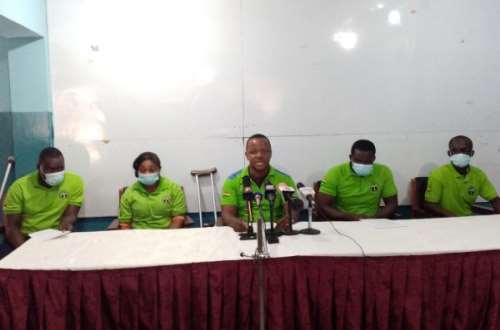By Kesah Princely in Cameroon.
Peter Tonain could never dream of using a White Cane when he used to run and play around with friends in his native Ashing, a village in the Boyo division of Cameroon’s Northwest region.
That was because Peter was sighted for nearly the first ten years of his life on Earth.
Today, he is not just a passionate White Cane user but also a strong advocate and leader of a large organisation of blind persons in the once seemingly peaceful but now conflict-ravaged Northwest region.
Born to the family of Joseph Ngong and Margaret Ngong in 1980, Peter enrolled in primary school but was cut short halfway into the journey.
One afternoon, Peter went playing around with friends but little did he know he would not be able to see again later that day.
“I felt like something had entered my eyes and that is how I gradually lost my sight”, he says.
Peter was 9 when his sight was lost and even at that, using a White Cane was not something he considered doing.
The young boy whose teachers envisaged would have a bright future due to his brilliance in school soon saw his dreams dwindling. This is because schools for the blind were not common in the 1980s.
You could also read What It Means To Live A Blind Person In CAMEROON
“I had to forget about education and lived at home for three years before finally discovering that being blind did not mean an end to my dreams”, he hopefully tells TWIFNEWS in an interview.
Such good news was made known to him by a reverent sister after Sunday mass in his native Ashing.
Immediately, he would be taken to enrol in a school for the blind known as SAJOCAH in Mambu, Bafut, a locality some 12 kilometres from the city of Bamenda, the administrative headquarters of the Northwest region.
But to have a smooth foundation to resume school, Peter had to undergo orientation and mobility lessons, seeing a White Cane for the very first time.
How to make the most of the White Cane became Peter’s newest challenge. In fact, he did not like the White Cane which is today part of his personality.
“I soon discovered that the White Cane is my identity, my autonomy and personal assistant,” intimates Peter.
The White Cane is important to any blind person around the world just as it is to Peter who has used it for over three decades now.
On Sunday, October 15, 2023, persons with visual impairment in Cameroon join millions of their peers all over the world to commemorate the International Day of the White Cane.
The White Cane is seen as a symbol of independence and equality to persons with visual impairment, the reason why this 69th edition is so important to them. Peter Tonain is executive President of the Hope Social Union for the Visually Impaired, HSUVI, an organisation of Blind and partially sighted persons in Bamenda, Northwest, Cameroon.
Peter says the White cane is particularly important to his members who have lived amidst a raging armed conflict now seven years “for us in the conflict-affected regions, I can reliably tell you the White Cane is our security,” Peter reveals convincingly.
You could read Cameroonians with Disabilities Decry Societal Neglect, Say Mental Health at Risk
Although he regrets that some blind persons have been violently attacked, and even killed in some cases, he however unequivocally intimates that many of them are alive today thanks to the White Cane.
“We have recorded testimonies that most of us have been safe on many occasions by both non/state armed groups and the military thanks to our White Canes. They know our White Canes and often respect them as much as possible,” he boasts.
23-year-old Meh Becajum recounts how his White Cane rescued him just when he was about to be whisked off by government forces.
“soldiers went round from house to house arresting all young men they came across. I was the lone male in our house that day when they came in and ordered me to follow them to their car which was parked in front of our house. Then, I pleaded with them to let me take with me my White Cane. As soon as they saw it, they apologised for stressing me up. My White Cane rescued me from sleeping in the sail for the first time,” he reveals joyfully.
On another occasion, soldiers were invading drinking spots in Ntamulung, a neighbourhood in Bamenda, seizing phones and other gadgets.
A local palm wine pallor was targeted where Edwin Nsah, a blind journalist was relaxing and chatting with friends.
“Suddenly, they came in and asked us to put all phones on the table. I first made sure I placed my cane on the table even before I struggled to get my phone out of my pocket. When they saw my White Cane, all of us in the bar were spared,” recounts Edwin.
One thing though which leaves the President of HSUVI very disturbed is the cost of a White Cane in Cameroon.
He says many still are not able to access White Canes because they are quite expensive.
The disability advocate entreats the government to
Make importation of White Canes tax-free so that users can readily have them.
His Organisation, HSUVI just turned 20 and he says philanthropists, organisations, and the government should support them lunch Operation One/man, one/cane this October 2023.
Other anniversary projects to better the living conditions of persons with visual impairment have been identified.



















